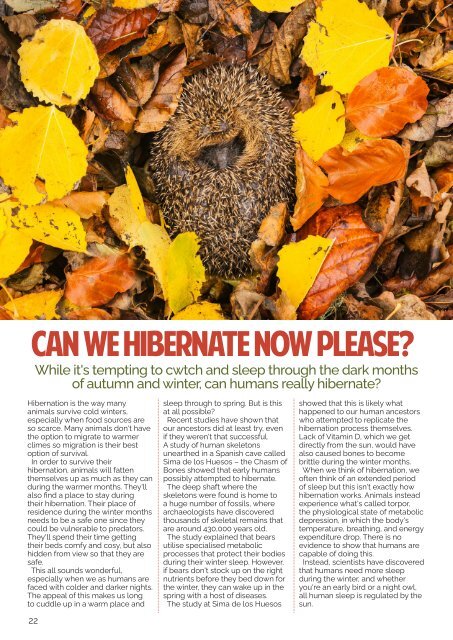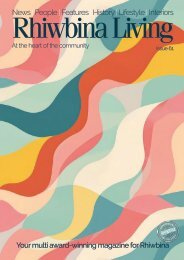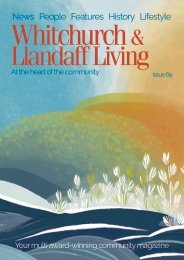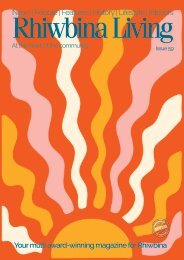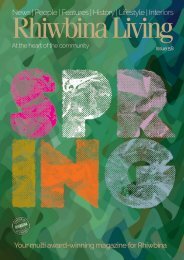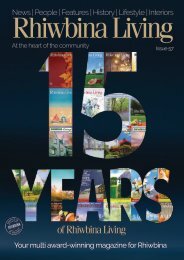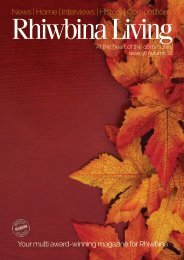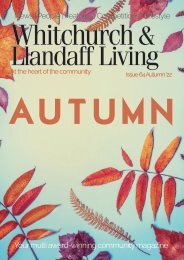Whitchurch and Llandaff Living Issue 68
Issue 68 of the award-winning Whitchurch and Llandaff Living magazine.
Issue 68 of the award-winning Whitchurch and Llandaff Living magazine.
You also want an ePaper? Increase the reach of your titles
YUMPU automatically turns print PDFs into web optimized ePapers that Google loves.
can we hibernate now please?<br />
While it's tempting to cwtch <strong>and</strong> sleep through the dark months<br />
of autumn <strong>and</strong> winter, can humans really hibernate?<br />
Hibernation is the way many<br />
animals survive cold winters,<br />
especially when food sources are<br />
so scarce. Many animals don't have<br />
the option to migrate to warmer<br />
climes so migration is their best<br />
option of survival.<br />
In order to survive their<br />
hibernation, animals will fatten<br />
themselves up as much as they can<br />
during the warmer months. They'll<br />
also find a place to stay during<br />
their hibernation. Their place of<br />
residence during the winter months<br />
needs to be a safe one since they<br />
could be vulnerable to predators.<br />
They'll spend their time getting<br />
their beds comfy <strong>and</strong> cosy, but also<br />
hidden from view so that they are<br />
safe.<br />
This all sounds wonderful,<br />
especially when we as humans are<br />
faced with colder <strong>and</strong> darker nights.<br />
The appeal of this makes us long<br />
to cuddle up in a warm place <strong>and</strong><br />
22<br />
sleep through to spring. But is this<br />
at all possible?<br />
Recent studies have shown that<br />
our ancestors did at least try, even<br />
if they weren't that successful.<br />
A study of human skeletons<br />
unearthed in a Spanish cave called<br />
Sima de los Huesos – the Chasm of<br />
Bones showed that early humans<br />
possibly attempted to hibernate.<br />
The deep shaft where the<br />
skeletons were found is home to<br />
a huge number of fossils, where<br />
archaeologists have discovered<br />
thous<strong>and</strong>s of skeletal remains that<br />
are around 430,000 years old.<br />
The study explained that bears<br />
utilise specialised metabolic<br />
processes that protect their bodies<br />
during their winter sleep. However,<br />
if bears don't stock up on the right<br />
nutrients before they bed down for<br />
the winter, they can wake up in the<br />
spring with a host of diseases.<br />
The study at Sima de los Huesos<br />
showed that this is likely what<br />
happened to our human ancestors<br />
who attempted to replicate the<br />
hibernation process themselves.<br />
Lack of Vitamin D, which we get<br />
directly from the sun, would have<br />
also caused bones to become<br />
brittle during the winter months.<br />
When we think of hibernation, we<br />
often think of an extended period<br />
of sleep but this isn't exactly how<br />
hibernation works. Animals instead<br />
experience what's called torpor,<br />
the physiological state of metabolic<br />
depression, in which the body's<br />
temperature, breathing, <strong>and</strong> energy<br />
expenditure drop. There is no<br />
evidence to show that humans are<br />
capable of doing this.<br />
Instead, scientists have discovered<br />
that humans need more sleep<br />
during the winter, <strong>and</strong> whether<br />
you're an early bird or a night owl,<br />
all human sleep is regulated by the<br />
sun.


